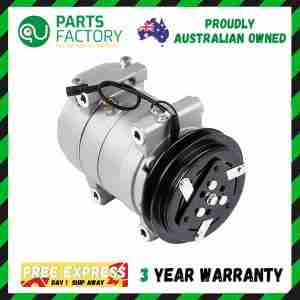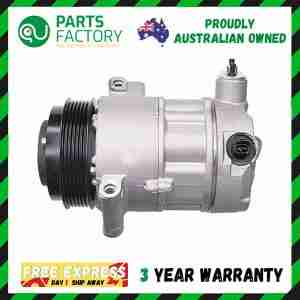How to Know if Air Conditioning Compressor is Bad
Hyundai I-Load Air Conditioning Compressor Suit 2007-2015 D4CB 2.5L Diesel
$550.00 Original price was: $550.00.$350.00Current price is: $350.00.
Kia Rio Air Conditioning Compressor Suit UB Models 2011-2016 1.4L 1.6L Petrol 977011R100
$500.00 Original price was: $500.00.$350.00Current price is: $350.00.
Holden Rodeo Air Conditioner Compressor Suit RA 2003-2008 2.4L & 3.0L Petrol & Diesel C09-9660
$500.00 Original price was: $500.00.$350.00Current price is: $350.00.
Honda Civic Air Conditioner Compressor 2006-2012 1.8L Petrol R18A C09-9635G
$600.00 Original price was: $600.00.$350.00Current price is: $350.00.
Hyundai Ix35 Air Conditioner Compressor Suit LM Models 2013-2015 2.0 Petrol G4NC
$1,000.00 Original price was: $1,000.00.$548.30Current price is: $548.30.
Holden Commodore Air Conditioner Compressor VE 2006-2013 3.6L SV6 92265301
$600.00 Original price was: $600.00.$448.30Current price is: $448.30.
Mitsubishi Colt Air Conditioner Compressor Suit RG 2006-2012 4G15 7813A138
$660.00 Original price was: $660.00.$400.00Current price is: $400.00.
Holden Commodore Air Conditioner Compressor Suit VT VX VY VU V6 3.8L 1135157
$450.00 Original price was: $450.00.$350.00Current price is: $350.00.
How to Know if Air Conditioning Compressor is Bad
A malfunctioning air conditioning (AC) compressor can quickly turn a comfortable drive into a sweaty, uncomfortable experience, especially during hot summer months. The AC compressor is a vital component of your vehicle’s cooling system, responsible for circulating refrigerant and cooling the air inside the cabin. When it starts to fail, it’s essential to recognize the signs early on to prevent further damage and costly repairs. In this guide, we’ll explore how to identify if your air conditioning compressor is bad and what steps you can take to address the issue.
Understanding the AC Compressor:
Before diving into the signs of a failing AC compressor, let’s briefly understand its role. The compressor pressurizes and circulates refrigerant through the AC system, allowing it to absorb heat from the cabin and release it outside. When the compressor fails, the entire cooling process is compromised, leading to warm air blowing from the vents.
How to Know if Air Conditioning Compressor is Bad
1. Weak or Warm Airflow:
One of the most obvious signs of a failing compressor is weak or warm airflow from the vents. If you notice that the air coming out of the vents is not as cold as it used to be or is significantly weaker, it could indicate a problem with the compressor.
2. Loud or Unusual Noises:
A malfunctioning compressor may produce loud or unusual noises when in operation. These noises can range from grinding or squealing sounds to rattling or banging noises. Any abnormal sounds coming from the AC system should be investigated promptly to prevent further damage.
3. AC Clutch Not Engaging:
The AC compressor is equipped with a clutch that engages and disengages to control the flow of refrigerant. If the clutch fails to engage when the AC is turned on, it could indicate a problem with the compressor or the clutch itself.
4. Leaking Refrigerant:
Refrigerant leaks are common in older AC systems and can lead to compressor failure if left unaddressed. Look for signs of oily residue around the compressor or refrigerant lines, as this could indicate a leak. Low refrigerant levels can also cause the compressor to overheat and fail.
5. Compressor Cycling On and Off:
A healthy AC compressor should cycle on and off intermittently to maintain the desired cabin temperature. However, if you notice frequent or rapid cycling of the compressor, it could indicate an underlying issue such as low refrigerant levels or a failing compressor.
What to Do if Your AC Compressor is Bad:
If you suspect that your AC compressor is failing based on the signs mentioned above, it’s essential to address the issue promptly to avoid further damage to the system. Here are some steps you can take:
Consult a Professional: If you’re unsure about the source of the problem or how to fix it, consult a professional mechanic who specializes in automotive air conditioning systems.
Diagnosis and Repair: A qualified technician can diagnose the issue using specialized tools and equipment. Depending on the severity of the problem, repairs may range from replacing the compressor clutch to installing a new compressor.
Regular Maintenance: To prevent future compressor issues, adhere to a regular maintenance schedule for your vehicle’s AC system. This includes checking refrigerant levels, inspecting for leaks, and replacing worn-out components as needed.
Consider Environmental Impact: If your AC system requires refrigerant replacement or compressor repair, consider opting for eco-friendly refrigerants and sustainable repair practices to minimize environmental impact.
How to Know if Air Conditioning Compressor is Bad
Identifying and addressing a failing air conditioning compressor early on can save you time, money, and discomfort in the long run. By staying vigilant for the signs mentioned above and taking proactive measures to maintain your AC system, you can ensure that your vehicle stays cool and comfortable, even during the hottest days of the year. Remember to seek professional assistance if you’re unsure about diagnosing or repairing AC compressor issues on your own.
















